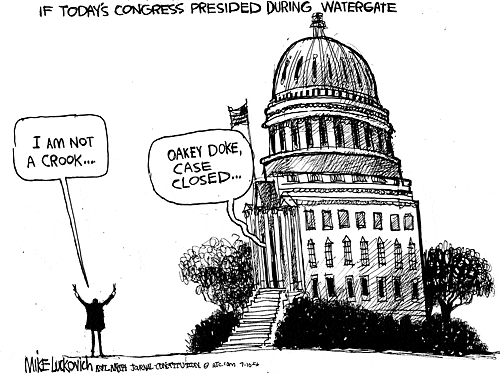Monday, May 9, 2011
Media Bias - Why be biased?
I chose to do my paper on the mosque near Ground Zero. I thought such a sensitive subject would enable me to find the bias easier. There were definitely biases on both sides of the political spectrum. But the thing that interested me most was the divide between Liberalism and Conservatism.
I read an interesting article where a Congressman described how Republican and Democratic congressmen can be friends, play a round of golf, go fight on the senate floor about an issue and then have dinner together all the while raising children together. As students who are trying to decipher bias, we need to be aware of the motive of bias. By antagonizing and distancing sides, the media creates a base for their product. In the end it is all about viewership and news sources need viewers/buyers. By creating a greater divide then there really is, the news cements their role in the lives of those who believe what they show.
As students studying this bias, we need to be aware that often the rhetoric in which news outlets depict their news is meant to increase a divide that, relative to other countries and their political parties, is really minute.
Sunday, March 6, 2011
Difference in portrayal - How we see wars
We watched a clip from a British reporter in Iraq and suffice it to say it was much less graphic than some of the clips American stations show.
Is this bad? Is it better to see something in it's trueness or better to not be exposed to such violence and death?
I think it definitely has to do with the way they (either the government or the CEO's of the new stations) want the war perceived. In Britain, they don't need popular support because they are not heavily invested in the war, so the news reports will not incite too much emotion.
In the US, we need public support because we have such investment in the war. In the US, you will see the enemy in wars, you will hear how they need to be quelled and you will not see (most of the time) the dead in the wars (look into the whole thing with President Bush forbidding news casters from bases where caskets are returned to America). Therefore, our opinion of the war is more favorable because we see the enemy and want them gone. Conversely, if the news shows victims, we will react with anti-war tirades and demand a cessation to the war.
Top Secret - Our right to know?
We talked last week in class about scandals and the release of many confidential documents. The class was split on whether or not it is the medias right. We talked about NY Times vs. U.S. (1971) and how the Supreme Court allowed the publishing of an internal report in the Department of Defense because it can be public knowledge.
I disagree with the ruling. I believe that it is our right as Americans to be aware of certain information. However, in this case the documents were stolen, published and the Supreme Court allowed them to be published! If I stole someones notes in class and published them, I would be fine. I might get in trouble for stealing but that information can be published.
That just sounds absurd to me. If this information is acquired by stealing and the information stolen wasn't even controversial - it was just a report they commissioned to see what went wrong in Vietnam - it should not be allowed to published.
That being said, certain information should be publicly accessible - The challenge is where to draw the line.
I disagree with the ruling. I believe that it is our right as Americans to be aware of certain information. However, in this case the documents were stolen, published and the Supreme Court allowed them to be published! If I stole someones notes in class and published them, I would be fine. I might get in trouble for stealing but that information can be published.
That just sounds absurd to me. If this information is acquired by stealing and the information stolen wasn't even controversial - it was just a report they commissioned to see what went wrong in Vietnam - it should not be allowed to published.
That being said, certain information should be publicly accessible - The challenge is where to draw the line.
Saturday, March 5, 2011
Youtube - Media outlet for Anti-American Yemeni Cleric
Anwar al-Awlaki is an American born Cleric who is now hiding in Yemen. He recently uploaded anti-American videos to Youtube and when congress asked Youtube to remove them, Youtube obliged.
However, if you now search, you can still find many videos on Youtube by Mr. Awlaki. Congress is hesitant to pass any law banning these videos as it will probably be a violation of the 1st Amendment.
What is interesting here is that Youtube, a popular social media site, is being used to propagate anti-American ideals. It is being used as a platform to spread these ideas when, most likely, no other source available to United States Muslims (his target audience) would allow Mr. Awlaki airtime.
In our discussion of media and politics, we need to also analyze other news sources, like Youtube, which allow anybody with internet access to reach a worldwide audience. Never in human history has it been so easy to reach so many people, so fast. Even 15 years ago, only the most powerful and rich could reach millions. This power was reserved for CEO's, governments and newspapers. Now, anyone can post something that can be accessible by billions of people.
Congress is concerned with Youtube because these mediums have sway in the political arena.
http://www.nytimes.com/2011/03/05/world/middleeast/05youtube.html?_r=1&partner=rss&emc=rss
However, if you now search, you can still find many videos on Youtube by Mr. Awlaki. Congress is hesitant to pass any law banning these videos as it will probably be a violation of the 1st Amendment.
What is interesting here is that Youtube, a popular social media site, is being used to propagate anti-American ideals. It is being used as a platform to spread these ideas when, most likely, no other source available to United States Muslims (his target audience) would allow Mr. Awlaki airtime.
In our discussion of media and politics, we need to also analyze other news sources, like Youtube, which allow anybody with internet access to reach a worldwide audience. Never in human history has it been so easy to reach so many people, so fast. Even 15 years ago, only the most powerful and rich could reach millions. This power was reserved for CEO's, governments and newspapers. Now, anyone can post something that can be accessible by billions of people.
Congress is concerned with Youtube because these mediums have sway in the political arena.
http://www.nytimes.com/2011/03/05/world/middleeast/05youtube.html?_r=1&partner=rss&emc=rss
Nixon: Did his actions create the seemingly Moral President?
We mentioned in class how Nixon's actions increased the amount that the media watched the president. Because of him, the scrutiny of the president by the media increased and presidents had to start worrying about their image. Past presidents were not the most moral of people (they might have been good people, but they clearly had moral flaws, JFK being a good example because he was known as promiscuous yet is one of the most beloved presidents).
This can be good or bad: On the one hand, the president is being held to a higher moral standard or at least he is being pressured to watch his actions and to not act so lewd in public, creating this image of morality. On the other hand, the president is having lower positioned people make statements and leak things to the public because he can't be heard saying certain things. Meaning, since he is being scrupulously watched, he has to have more deniablity and as a result will lie and be in favor of having other people do his dirty work... It sort of makes him "morally false"...
I can't think which is better.
This can be good or bad: On the one hand, the president is being held to a higher moral standard or at least he is being pressured to watch his actions and to not act so lewd in public, creating this image of morality. On the other hand, the president is having lower positioned people make statements and leak things to the public because he can't be heard saying certain things. Meaning, since he is being scrupulously watched, he has to have more deniablity and as a result will lie and be in favor of having other people do his dirty work... It sort of makes him "morally false"...
I can't think which is better.
Tuesday, February 15, 2011
Continuing my previous post: How technological companies are affecting the Middle East...
This week the King of Saudi Arabia set up a Facebook page to connect with the people better. Despite Facebook being the cause of a lot of the civil unrest in the Middle East these past weeks, Saudi Arabia set it up and posted phone and fax numbers. The page will not allow posting, to prevent a "Facebook" protest, but it will be up to date with new information and contact information.
I think, perhaps, the motive of such a page can be to gain favor with the people and prevent the spread of revolt here. If the people have a sufficient outlet for their problems and this outlet is Facebook, at least externally it will look like the Saudi Arabian government is more liberal. Imagine you are from Saudi Arabia and you hear about all the protests over the lack of internet and your own government encourages it's use.
Monday, February 7, 2011
Google: Effecting the Revolt in Egypt...
We all read about what happened and is continuing to happen in Egypt as the people revolt. I, like many of you, read mainstream news sites and might only hear about the political aspects of the revolt. Interestingly, the tech community has a lot to talk about as well.
Google this week prepared to set up a text-to-tweet service so the people in Egypt can communicate with the outside world without internet. I think this is a perfect "tell" on our world now: how corporations and businesses effect the world. Here, Google, and not a foreign government, is going to provide the ability and route for the Egyptian people to communicate. The idea is that the phones are still in service and you can text Google numbers and they will tweet it. Take a look:
http://tech.fortune.cnn.com/2011/01/31/google-and-twitter-hook-up-to-allow-egyptians-to-tweet/
Google this week prepared to set up a text-to-tweet service so the people in Egypt can communicate with the outside world without internet. I think this is a perfect "tell" on our world now: how corporations and businesses effect the world. Here, Google, and not a foreign government, is going to provide the ability and route for the Egyptian people to communicate. The idea is that the phones are still in service and you can text Google numbers and they will tweet it. Take a look:
http://tech.fortune.cnn.com/2011/01/31/google-and-twitter-hook-up-to-allow-egyptians-to-tweet/
Subscribe to:
Comments (Atom)






